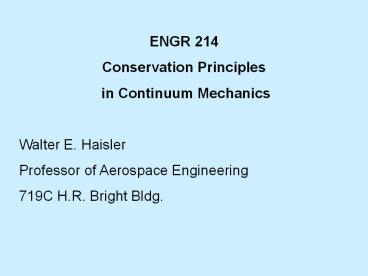ENGR 214 - PowerPoint PPT Presentation
1 / 27
Title:
ENGR 214
Description:
Review (work) Problems at end of Chapter 1. Vector and Matrix Review ... Force distribution on an automobile tire (when skidding)? Both normal and shear forces? ... – PowerPoint PPT presentation
Number of Views:70
Avg rating:3.0/5.0
Title: ENGR 214
1
ENGR 214 Conservation Principles in Continuum
Mechanics Walter E. Haisler Professor of
Aerospace Engineering 719C H.R. Bright Bldg.
2
To Do Today
- Review Syllabus
- Textbook Available from Copy Corner, 21
- Web page http//aeromaster.tamu.edu/haisler/eng
r214
- Listserv Sign-up at listserv_at_listserv.tamu.edu
(see instructions in
syllabus)
- Team Organization Complete information form
- REMINDERS
- Review (work) Problems at end of Chapter 1
- Vector and Matrix Review
3
COMPUTER ACCOUNTS All users will be required to
use an individual user name to gain access to the
computers in this lab. Your user name will be
the initials of your first and last name and the
last 5 digits of your social security
number. Example John David Smith 123-45-6789,
User name would be js56789 If you have a
hyphenated name, experiment since it may be
either way! Example Mary Doe-Smith
123-45-6789, the User name would be md56789, but
it might be entered as ms56789 Your password
will be the same as your user name and when you
log on for the first time you will be prompted to
change your password. If you forget your
password you will need to go to room 340C (Mark
Hopcus) to request a new one. You will need to
bring your student ID when requesting a new
password.
4
THE BASIC CONSERVATION PRINCIPLE some of IT
the rest of IT all of IT IT whatever you
are counting/conserving (perhaps a little too
simple!?)
5
The General Accounting/Conservation Statement
6
CONTINUUM A SYSTEM which has MASS and VOLUME AND
whose PROPERTIES and RESPONSE to INPUT are
continuous FUNCTIONS of SPACE and TIME and have
continuous derivatives (USUALLY DESCRIBED BY
DIFFERENTIAL EQUATIONS)
7
What is the difference between ENGR 211 and 214
approaches to Conservation Principles? ENGR
211 ENGR 214 the free-body
diagram of the problem System vs.
Continuum Macro vs. Micro Scale Entire
Body vs. Differential Element
the equations for the problem Global
vs. Local Equations Algebraic vs.
Differential Equations
8
SOME THOUGHTS FROM THE INSTRUCTOR (on learning
and life) I cannot teach you everything or show
you the solution to every problem in the world
therefore, you must learn the basic principles
and procedures and not solutions to specific
problems. Taking responsibility for your own
actions, words and station-in-life allows you
(forces you) to grow as a person. You will find,
when you die, that that part of yourself which
you gave to others does not die with
you. Probably the most important thing you will
learn in life are kindness, honesty, humility and
love for one another.
9
(No Transcript)
10
- Lets consider some real-world examples and see
what Conservation Principles apply and what
information they provide. - Turbine Engine
- Heat Transfer Problem
- Structure
11
PW500 Turbine ENGINE
12
- Based on your knowledge from ENGR 211, 212 what
analysis and design information can you
determine? - Mass flow rates
- Average velocities
- Other ?
- What further information about the solution and
design would be desirable in order to have a
better understanding?
13
Temperature and Stress Distribution in a Heated
Pipe
14
Insulated Walls
15
Simple Truss-Girder Bridge
16
Another Bridge - Does the assumption of truss
members still hold?
17
What is the Force Distribution?
- Under your foot while standing? Is it uniform?
What is the force per unit area?
- Force distribution on an automobile tire (where
it contacts the pavement)? Is it uniform?
- Force distribution on an automobile tire (when
skidding)? Both normal and shear forces?
- Inside a Diving Board?
18
- Force Distribution inside Diving Board?
Suppose we just pulled on the diving board? What
is the internal axial force distribution in the
board?
19
- Force Distribution inside Diving Board?
Suppose we have a transverse load as shown above?
What is the internal axial force distribution in
the board?
20
- Force Distribution inside Diving Board?
Suppose we have a transverse load as shown above?
What is the internal shear force distribution in
the board?
21
- Force Distribution inside Diving Board?
- Notice that in this case the internal forces are
distributed in some fashion over the
cross-section. For a long slender beam, - the internal axial force varies linearly from top
to bottom (max at top or bottom, zero at center),
- the internal shear force varies parabolicly (max
at center, zero at top and bottom). - These distributed internal forces are applied
over an area and are called stresses (force per
unit area).
22
Sign Support Structure
- What types of loads need to be considered?
- Weight of structure
- Wind loads
- Vehicle impact
- Material selection?
- Steel
- Aluminum
- Other?
- What type of analyses need to be done?
- Truss
- Torsion of post
- Bending of post
23
(No Transcript)
24
(No Transcript)
25
(No Transcript)
26
(No Transcript)
27
(No Transcript)































